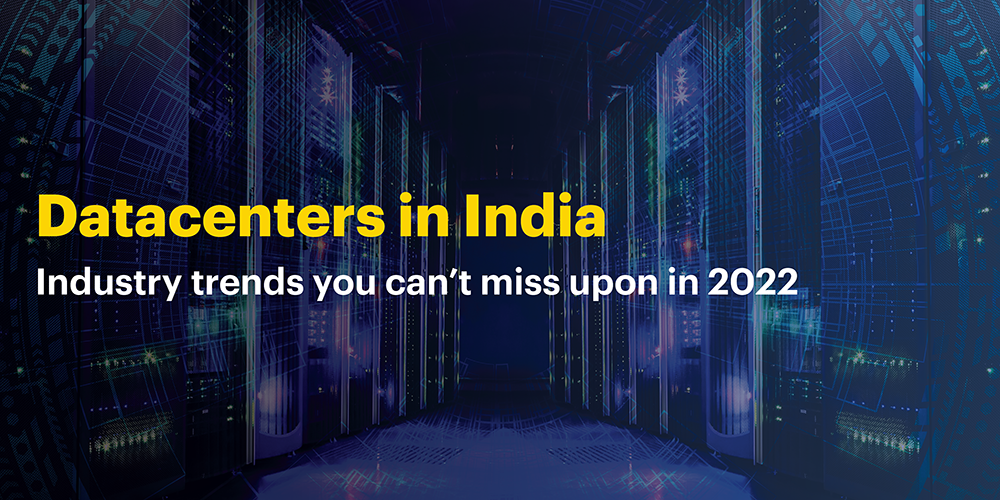Introduction
India has a developing tech sector, including cloud computing and management, and with that, the need for smart data centers is also at an all-time high. Data centers, which began from tiny cubicles, now need offices full of IT operators and equipment managers to store and process a company’s data. Administrators and analysts who maintain and preserve center availability play pivotal roles and customers have high expectations in terms of accessibility and responsiveness, due to which human and computerized data centers are a necessity today.
This blog discovers some positive impacts of having new data centers in India.
Current data center trends in India
The automation of data centers has been of utmost benefit to the Indian tech sector. Manual handling of technology causes disruption, but an AI-powered data center seems seamless if the power necessity is met. To summarize, the entire plan of implementing a data center is to promote efficiency, cut down costs, and protect power as much as possible. It can be said that data centers run the industrial world, and data centers are the industrial world’s powerhouses. Data centers serve businesses in a range of methods, and they enable a firm to concentrate on its customer aims rather than just technological upkeep.
Numerous Indian businesses are now in the initial days of internet growth and implementation, making it difficult for the volatility of technology in the next few years. According to research, by 2026, this industry is expected to grow at 12% CAGR after receiving investments of US $8 billion.
- In Q3 2020, the COVID-19 pandemic compelled to satisfy the ever-increasing demand for data center capacity.
- An investment of about US $340 million was made by Adani Group to set up a hyperscaler data center infrastructure in Chennai.
- Ericsson foresees that by 2026 there will be about the US $350 million 5G connections.
As of now, there is a planned enactment of a new data center in Noida, Uttar Pradesh. This center will be the state’s very first one under the company—Yotta Infrastructure. The entire budget of this project is about US $950 million. The colocation will have 6 connected data centers delivering 30,000 server frames capacity and 200 megawatts of power.
The completion of this data center has been projected to be in July 2022. This data center will not only be the largest in UP but will be renewably powered. It will be an excellent advancement for the state in terms of tech development.
Benefits of Developing Data Centers in India
Data centers bridge the gap between poor connectivity in rural or, sometimes, urban areas and bring better technical support. Having a smartphone and being digitally connected is the need of the hour. We’re amidst Industry 4.0, witnessing rapid and efficient tech changes.
- Facilitating the use of the internet
Data centers cater to data exchanges so everyone can facilitate the use of the internet within their location range. In India, we have data centers in major metropolitan cities like Mumbai, whereas some rural areas lack the same. Data centers will also benefit tier 2 and 3 cities to gain connectivity.
Data center specialists or people working at one are responsible for managing immediate connectivity. The scenario in rural India is that everyone owns a smartphone, but there is no connectivity at times. However, with successful programs in India for the digital movement, such as Jan Dhan-Aadhar-Mobile, data centers have made digitization reach the rural heartland with speed and ease. - Increase in Local Labor
Furthermore, a requirement of skilled workforce, International standards need individuals in the data center sector to have specific expertise in electricity, fiber, mechanical cooling, security, civil engineering, essential technological skills such as programming languages and tools. India has a significantly qualified workforce for entry-level professions, offering the potential for training and upskilling the local labor. As the data center sector has grown, opportunities for information sharing and staff training to match global standards have opened up, propelling India forward as a critical technological player. - Secure Data Storage
The amount of cyber-attacks against businesses has also increased the challenges and risks that come with losing data. Data centers could prove to be a safer option to store data than traditional on-premises methods of storage. Network devices, storage systems, and servers have been reduced to a minimum, and in the event of power shortages, they can fail, which was not a problem earlier with older equipment. Data centers do not just ensure reliable storage but also help eradicate the glitches that plague portable technology. - Protecting Power
Servers that are kept on-site are susceptible to greater broadband issues. This could cause chaos for companies due to technological or natural power interruptions. Organizations that outsource data may reduce the effects of a power loss or any other catastrophe. Additionally, in the event of power failures lasting even 1/5th of a second, IT equipment could be unavailable for anywhere from up to a few hours. Sometimes, these power failures could be a cause of insolvency should they cause data loss.
Conclusion
Technological advancements have changed our methods of sustainability and working, but changing the way we behave to accommodate new requirements isn’t easy. If businesses and companies are looking to reap the full benefits of the data center, they might require some adjustments to their processes. The potential benefits could be transformational both financially and operationally for companies eager to adapt and reinvent their strategies for data and data centers.
The studies demonstrate that the data center sector is thriving as digital advancement is becoming a never-ending process. India has a developing tech sector, and with that, the need for smart data centers is at an all-time high.
To get the most out of this trend, partner with Team Computers in your Digital Transformation Journey by reaching out to our experts.
